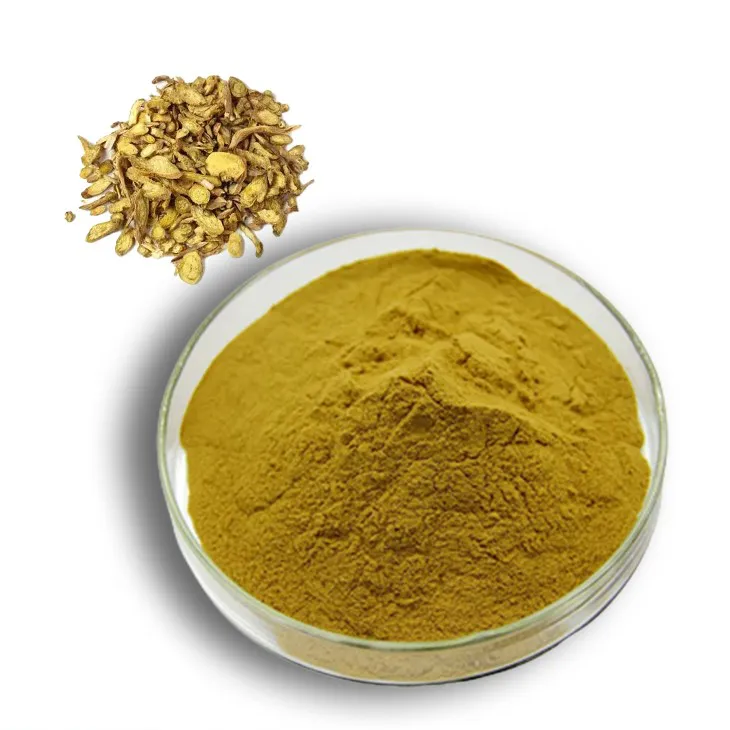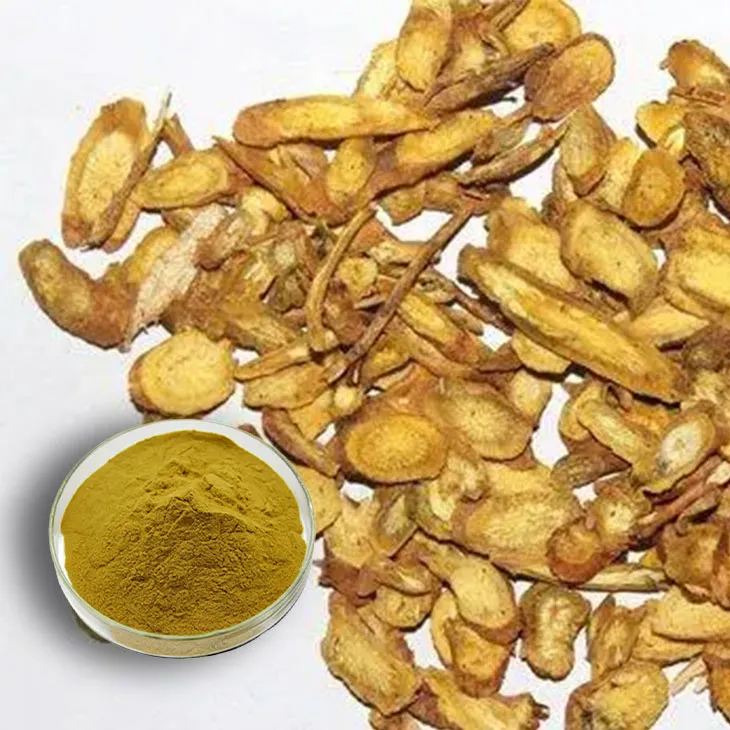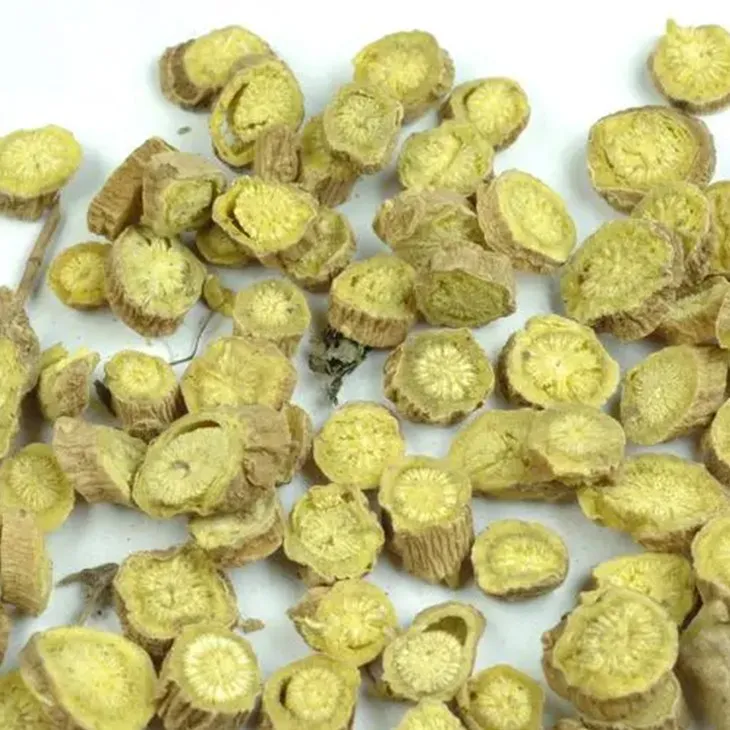- 0086-571-85302990
- sales@greenskybio.com
What is baicalin and why is it used on the skin?
2024-11-14

1. Introduction to Baicalin
Baicalin is a highly important bioactive compound that is derived from Scutellaria baicalensis. As a flavonoid, it possesses remarkable chemical properties. Flavonoids are a large class of polyphenolic compounds that are widely distributed in plants and are known for their diverse biological activities. Baicalin, in particular, has been the subject of extensive research due to its potential benefits in various fields, especially in relation to skin health.

2. Anti - aging Properties on the Skin
2.1 Cellular - level Interference One of the most significant aspects of baicalin's application on the skin is its anti - aging potential. At the cellular level, baicalin can interfere with the mechanisms that contribute to skin aging. Skin aging is a complex process that is influenced by both internal factors, such as genetic predisposition and hormonal changes, and external factors like ultraviolet (UV) radiation, pollution, and lifestyle choices. Baicalin targets certain cellular pathways that are involved in the breakdown of collagen and elastin, two proteins that are essential for maintaining the skin's firmness and elasticity.
2.2 Collagen and Elastin Maintenance Collagen provides the structural framework for the skin, while elastin allows the skin to stretch and recoil. As we age, the production of collagen and elastin decreases, and the existing fibers may become damaged or degraded. Baicalin helps in maintaining the integrity of these fibers. It does this by inhibiting enzymes that break down collagen and elastin, such as matrix metalloproteinases (MMPs). By reducing the activity of MMPs, baicalin can slow down the degradation process, thereby helping to keep the skin looking youthful and supple.

3. Compatibility with Different Skin Types
3.1 Benefits for Dry Skin Baicalin offers numerous benefits for different skin types. In the case of dry skin, it can enhance the skin's moisture - retaining ability. Dry skin lacks sufficient hydration, which can lead to a dull complexion, flakiness, and discomfort. Baicalin helps to improve the skin's natural moisturizing factor (NMF). The NMF is a complex mixture of substances in the skin that helps to attract and retain water. By enhancing the NMF, baicalin can make the skin feel softer and more hydrated.
3.2 Regulation for Oily Skin For oily skin, baicalin may play a role in regulating sebum production. Sebum is an oily substance produced by the sebaceous glands in the skin. Excessive sebum production can lead to a greasy appearance, clogged pores, and an increased risk of acne. Baicalin can help to balance sebum production by modulating the activity of the sebaceous glands. This can result in a reduction in the greasiness of the skin, while still maintaining the skin's natural moisture balance.
3.3 Soothing Sensitive Skin Sensitive skin is prone to irritation, redness, and inflammation. Baicalin has anti - inflammatory and soothing properties that can be highly beneficial for this skin type. When the skin is exposed to irritants or allergens, it can trigger an inflammatory response. Baicalin can calm this response by reducing the production of inflammatory mediators, such as cytokines. This can help to soothe irritated skin, reduce redness, and improve the overall appearance of sensitive skin.

4. Enhancement of Skin's Natural Barrier Function
4.1 Importance of Skin Barrier A healthy skin barrier is crucial for maintaining skin health. The skin barrier acts as a protective shield, preventing the penetration of harmful substances, such as pollutants, toxins, and microorganisms, into the skin. It also helps to retain moisture within the skin, preventing dehydration. A compromised skin barrier can lead to various skin problems, including dryness, sensitivity, and an increased susceptibility to infections.
4.2 Baicalin's Contribution Baicalin contributes to the enhancement of the skin's natural barrier function by strengthening the intercellular junctions in the skin. The intercellular junctions are the connections between skin cells that help to hold them together and form a tight barrier. Baicalin can improve the integrity of these junctions, making the skin barrier more effective. This can result in better protection against external threats and improved moisture retention within the skin.

5. Other Potential Skin Benefits of Baicalin
5.1 Antioxidant Activity Baicalin also exhibits antioxidant activity on the skin. Antioxidants are substances that can neutralize free radicals. Free radicals are highly reactive molecules that are generated in the body as a result of normal metabolic processes, as well as exposure to environmental factors such as UV radiation and pollution. Free radicals can cause damage to cells, including skin cells, by oxidizing lipids, proteins, and DNA. By acting as an antioxidant, baicalin can scavenge free radicals, thereby reducing oxidative stress on the skin and protecting it from damage.
5.2 Whitening and Brightening Effects Another potential benefit of baicalin on the skin is its whitening and brightening effects. Hyperpigmentation, which is characterized by dark spots or an uneven skin tone, can be a concern for many people. Baicalin may help to reduce hyperpigmentation by inhibiting the activity of tyrosinase, an enzyme that is involved in the production of melanin. Melanin is the pigment that gives color to the skin, hair, and eyes. By reducing melanin production, baicalin can lead to a lighter and more even skin tone.
6. Conclusion
Baicalin is a compound with a wide range of potential benefits for the skin. Its anti - aging properties, compatibility with different skin types, ability to enhance the skin's natural barrier function, antioxidant activity, and potential whitening effects make it a valuable ingredient in skin care products. However, further research is still needed to fully understand its mechanisms of action and to optimize its use in skin care formulations. As the demand for natural and effective skin care ingredients continues to grow, baicalin is likely to receive more attention in the future.
FAQ:
What are the chemical properties of baicalin?
Baicalin is a flavonoid, which is a type of bioactive compound. It has certain chemical structures and properties that contribute to its various functions, especially in relation to its effects on the skin.
How exactly does baicalin interfere with skin - aging mechanisms?
At the cellular level, baicalin can target specific pathways involved in skin aging. It may act on cells to prevent the breakdown of collagen and elastin, which are important for maintaining skin structure. By doing so, it helps to keep the skin firm and elastic, reducing the signs of aging such as wrinkles and sagging.
Can baicalin cause any side effects on the skin?
Generally, baicalin is well - tolerated by the skin. However, in very rare cases, some individuals may experience mild irritation. This is highly individual - dependent and usually occurs when the skin is overly sensitive or when there is an allergic reaction to related products. But overall, it has a good safety profile when used appropriately.
How does baicalin regulate sebum production in oily skin?
The exact mechanism is still under research. It is hypothesized that baicalin may interact with the sebaceous glands in the skin. It could potentially influence the hormonal or enzymatic processes that control sebum production, thereby reducing the excessive oiliness associated with oily skin.
Is baicalin used in commercial skin care products?
Yes, baicalin is increasingly being used in commercial skin care products. Due to its multiple beneficial effects on the skin, such as anti - aging, skin - type compatibility, and barrier function enhancement, it has become an attractive ingredient for formulators. It can be found in various products including creams, lotions, and serums.
Related literature
- Title: The Role of Baicalin in Skin Health: A Comprehensive Review"
- Title: "Baicalin: A Promising Ingredient for Skin Anti - aging"
- Title: "Beneficial Effects of Baicalin on Different Skin Types"
- ▶ Hesperidin
- ▶ Citrus Bioflavonoids
- ▶ Plant Extract
- ▶ lycopene
- ▶ Diosmin
- ▶ Grape seed extract
- ▶ Sea buckthorn Juice Powder
- ▶ Fruit Juice Powder
- ▶ Hops Extract
- ▶ Artichoke Extract
- ▶ Mushroom extract
- ▶ Astaxanthin
- ▶ Green Tea Extract
- ▶ Curcumin
- ▶ Horse Chestnut Extract
- ▶ Other Product
- ▶ Boswellia Serrata Extract
- ▶ Resveratrol
- ▶ Marigold Extract
- ▶ Grape Leaf Extract
- ▶ New Product
- ▶ Aminolevulinic acid
- ▶ Cranberry Extract
- ▶ Red Yeast Rice
- ▶ Red Wine Extract
-
Eucommia Ulmoides Extract
2024-11-14
-
Mulberry Extract
2024-11-14
-
Coconut Water Powder
2024-11-14
-
Alfalfa Meal
2024-11-14
-
Longan Extract
2024-11-14
-
Hawthorn Extract
2024-11-14
-
Artichoke Leaf Extract
2024-11-14
-
Green coffee bean Extract
2024-11-14
-
Curcumin
2024-11-14
-
Oyster Mushroom Extract Powder
2024-11-14





















